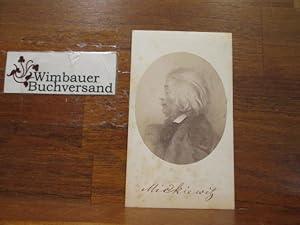Beschreibung
Altes Portriat von Adam Bernard Mickiewicz auf Karton aufgezogen (10,3x6,1 cm) unter dem Bild Namenszug "Mickiewicz" mit brauner Tinte.- Adam Bernard Mickiewicz, gilt als bedeutendster der Drei Barden der Polnischen Romantik in einer Zeit der Nichtexistenz eines polnischen Nationalstaats und als Nationaldichter Polens. Geboren: 24. Dezember 1798, Zavosse, Weißrussland Gestorben: 26. November 1855, Konstantinopel /// Adam Bernard Mickiewicz ([mit?s'k??vit??] (About this soundlisten); 24 December 1798 - 26 November 1855) was a Polish poet, dramatist, essayist, publicist, translator, professor of Slavic literature, and political activist. He is regarded as national poet in Poland, Lithuania and Belarus. A principal figure in Polish Romanticism, he is counted as one of Poland's "Three Bards" ("Trzej Wieszcze") and is widely regarded as Poland's greatest poet.[2][3][4] He is also considered one of the greatest Slavic[5] and European[6] poets and has been dubbed a "Slavic bard".[7] A leading Romantic dramatist,[8] he has been compared in Poland and Europe to Byron and Goethe.[7][8] He is known chiefly for the poetic drama Dziady (Forefathers' Eve) and the national epic poem Pan Tadeusz. His other influential works include Konrad Wallenrod and Grazyna. All these served as inspiration for uprisings against the three imperial powers that had partitioned the Polish-Lithuanian Commonwealth out of existence. Mickiewicz was born in the Russian-partitioned territories of the former Grand Duchy of Lithuania, which had been part of the Polish-Lithuanian Commonwealth, and was active in the struggle to win independence for his home region. After, as a consequence, spending five years exiled to central Russia, in 1829 he succeeded in leaving the Russian Empire and, like many of his compatriots, lived out the rest of his life abroad. He settled first in Rome, then in Paris, where for a little over three years he lectured on Slavic literature at the Collège de France. He died, probably of cholera, at Constantinople in the Ottoman Empire, where he had gone to help organize Polish and Jewish forces to fight Russia in the Crimean War. In 1890, his remains were repatriated from Montmorency, Val-d'Oise, in France, to Wawel Cathedral in Kraków, Poland. /// Autogramm Autograph signiert signed signee /// Standort Wimregal PKis-Box6-U037 pl Gewicht in Gramm: 10. Bestandsnummer des Verkäufers 243189
Verkäufer kontaktieren
Diesen Artikel melden
![]()


